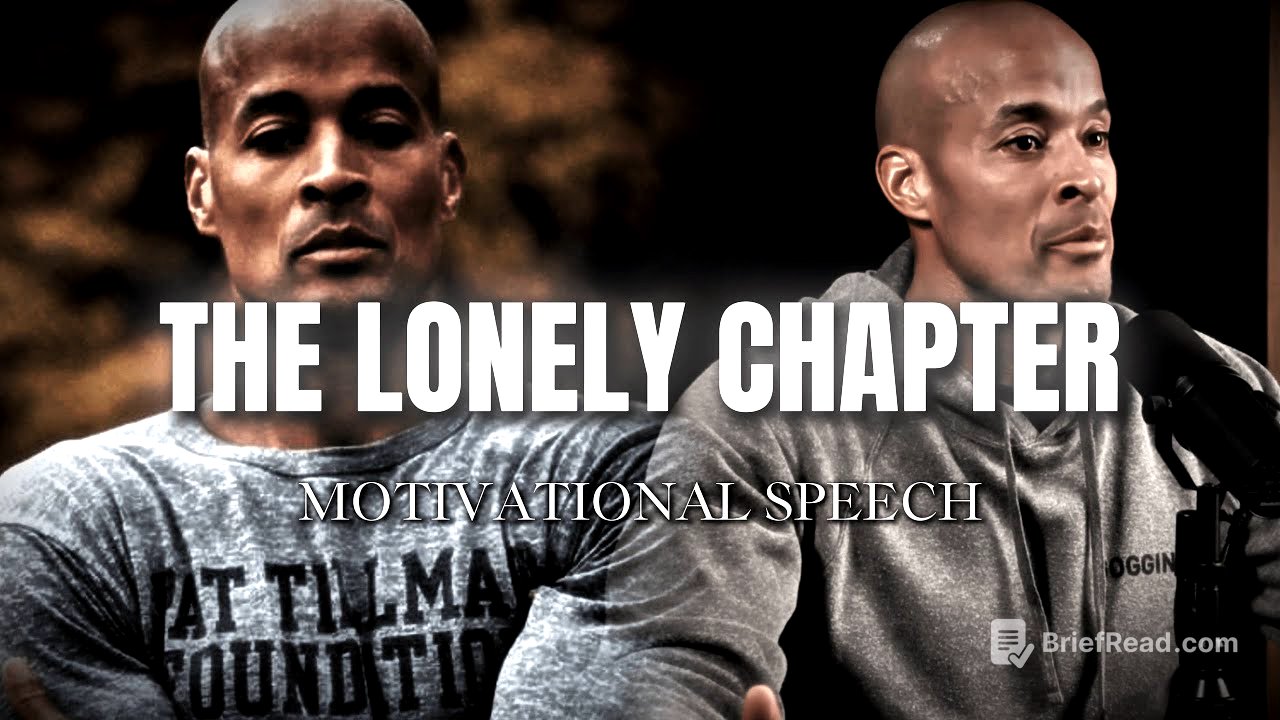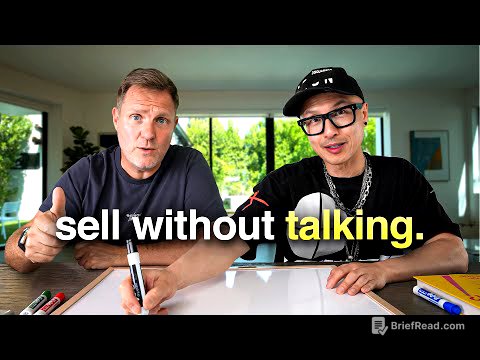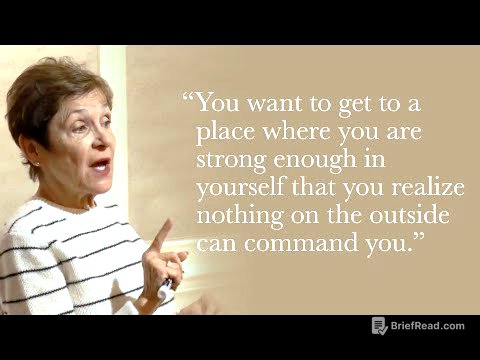TLDR;
David Goggins shares his insights on self-improvement, discipline, and overcoming personal limitations. He emphasizes the importance of facing one's insecurities, building belief through hard work, and clearing mental clutter to achieve consistency and discipline. He also touches on the need to embrace suffering, reject mediocrity, and continuously challenge oneself to unlock one's full potential.
- Facing insecurities and embracing the "ugly mirror" to start personal growth.
- Building belief through consistent hard work and tangible accomplishments.
- Clearing mental clutter to create space for discipline and consistency.
- Rejecting mediocrity and continuously challenging oneself to avoid complacency.
- Embracing suffering as a path to self-discovery and unlocking one's full potential.
Am I Happy? [0:00]
Goggins reflects on his personal journey, noting that happiness was never his primary goal. Instead, he focused on self-improvement and confronting his shortcomings. He emphasizes the importance of self-awareness and acknowledging one's flaws as a starting point for personal growth. He also highlights the fleeting nature of external rewards, stating that true satisfaction comes from internal validation and the pursuit of greatness.
Hard Work Looks Horrible [1:05]
Goggins argues that the path to success is not glamorous or motivating. It requires relentless hard work and dedication, often resembling a "nightmare" or a "train wreck" to outsiders. He criticizes motivational speakers who promote superficial techniques, advocating instead for tangible accomplishments and the development of mental and physical resilience. He underscores that the truth is a starting line, and life begins when one confronts their insecurities and accepts their current reality.
The Truth Is a Starting Line [2:08]
Goggins emphasizes the importance of self-honesty and confronting one's insecurities. He suggests that true personal growth begins when individuals acknowledge their weaknesses and shortcomings. He also criticizes the tendency to seek external validation and the fear of judgment, arguing that these factors hinder progress. He encourages listeners to embrace their authentic selves and pursue their goals without concern for others' opinions.
Building a Disciplined Life [5:42]
Goggins reflects on how he created an image of what a man should be and became that image through discipline. He stresses the importance of internal motivation and self-reliance, particularly for those who lack positive role models. He also highlights the power of the brain and the importance of feeding it with the right mental nutrients and internal dialogue. He advocates for being a practitioner rather than a theorist, emphasizing the need for real-world experience to validate one's beliefs.
Brutal Conversations [8:28]
Goggins discusses the challenges of communicating his mindset to others, noting that many people struggle to understand his relentless pursuit of self-improvement. He highlights the importance of building belief through daunting tasks and accumulating undeniable proof of one's capabilities. He also emphasizes the need to clear mental clutter to create space for discipline and consistency, comparing the mind to a circuit breaker that can overload if filled with too much negativity.
The Power of Repetition [12:51]
Goggins stresses the importance of repetition and consistent effort in overcoming limitations. He shares his personal experience of using negative experiences as fuel for self-improvement. He also emphasizes the significance of armoring oneself mentally and physically to face the challenges of the world. He describes his daily routine of running, which he uses as a form of mental preparation and self-discipline.
The Biggest Misunderstanding [17:21]
Goggins shares his perspective on his unique role in life, viewing himself as a "lab rat" designed to test the limits of human potential. He emphasizes the importance of focus and discipline in achieving greatness, criticizing the tendency to seek easy solutions and create narratives that justify mediocrity. He also underscores the need to challenge oneself continuously and reject the "get out of jail free cards" that society offers.
Outwork the Man [20:12]
Goggins reiterates the importance of hard work and self-improvement, emphasizing that there are no shortcuts or magic pills to success. He shares his personal struggles with learning and the constant battle against his inner voice of doubt. He also highlights the significance of staying hard and building willpower, even in the face of adversity.
The Scary Thing [22:45]
Goggins discusses the challenges of building willpower and the potential for it to unlock uncomfortable truths about oneself. He explains that once willpower is developed, it becomes a constant force that drives one to push their limits. He also emphasizes the importance of clearing mental space to create room for discipline and consistency, comparing the mind to a crowded garage that needs to be organized.
Discipline Changes Your DNA [25:06]
Goggins asserts that discipline is the key to personal transformation, capable of altering one's very DNA. He encourages listeners to dream beyond their limitations but to avoid making dreams their master. He emphasizes the importance of putting in the work behind the dream and focusing on the details and tasks required to achieve it. He also highlights the value of vulnerability and honesty in self-expression.
The Real Life [28:16]
Goggins expresses his frustration with people who seek easy solutions and attend conventions hoping to learn something different. He emphasizes that everyone knows what to do, but the challenge lies in doing it consistently. He also highlights the importance of building belief through tangible accomplishments and pushing oneself to extremes.
Building Belief [29:35]
Goggins shares his personal experience of building belief from a place of deep insecurity and self-doubt. He emphasizes the need to ingrain belief in one's brain through consistent action and pushing oneself beyond comfort zones. He also uses the metaphor of chipping away at a rock to illustrate the process of self-improvement and personal transformation.
Handling Failure [31:45]
Goggins shares his perspective on failure, viewing it not as a setback but as an attempt. He emphasizes the importance of trying to do something bigger than oneself and maintaining a positive mindset in the face of adversity. He also highlights the dangers of dwelling on past failures and the need to focus on the present moment.
Why Am I So Unique? [34:14]
Goggins reflects on his unique identity and the importance of staying true to oneself. He emphasizes the need to define one's own path and avoid following the crowd. He also highlights the value of studying bad situations and learning from them, using these experiences to build knowledge and resilience.
In the Dark Room [37:24]
Goggins emphasizes the importance of self-reflection and facing one's insecurities in a "dark room." He encourages listeners to create a stronger version of themselves that can overcome their weaknesses and fears. He also highlights the need to visualize this transformation and embrace a mindset of not caring about being judged.
Extract Greatness From Nothing [42:04]
Goggins discusses the challenges of extracting greatness from nothing, emphasizing the obsession and dedication required to achieve it. He explains that his books are an attempt to dumb down his "crazy psychotic brain" and provide people with tools they can use in their lives. He also highlights the importance of experiencing the "barbaric life" firsthand, as it cannot be fully captured in writing.
The Conqueror's Mindset [43:49]
Goggins describes his conqueror's mindset, characterized by constant thinking, discipline, and a refusal to deviate from his path. He criticizes the cookie-cutter advice often given and emphasizes the importance of clearing mental clutter to create space for discipline. He also highlights the need to continuously challenge oneself and build new mountains to avoid complacency.
Mediocrity Is Contagious [46:59]
Goggins warns against the dangers of mediocrity and the allure of a "civilized" life. He emphasizes the importance of continuous accountability and setting an example, even after retirement. He also highlights the need to constantly callous over one's victim mentality and maintain a savage mindset.
Wired Different [48:49]
Goggins rejects the notion that he is "wired different," explaining that his relentless pursuit of self-improvement is a conscious choice. He emphasizes the need to constantly owe the machine and avoid getting rusty. He also underscores the importance of facing one's fears and insecurities to achieve personal growth.









